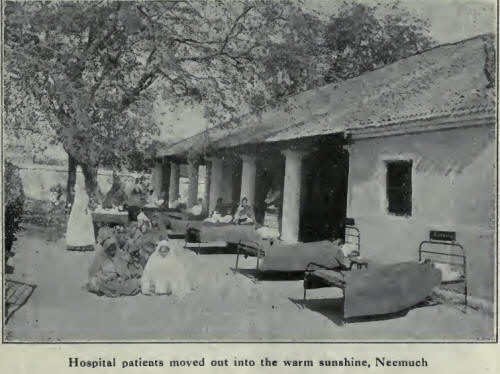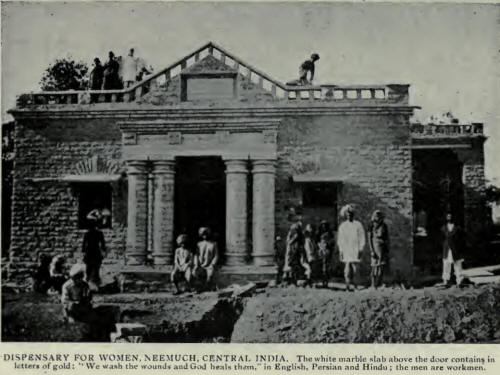|
THE aim of this sketch is to show how God led
Dr. MacKellar up till the time she became a missionary, but we
feel we cannot conclude it without referring briefly to her work in
India.
An extract from a letter she wrote after having been a short time in India
gives an idea of one kind of work she had to do. (It should be remembered
that in those early days there was no Zenana Hospital in our Mission. Our
pioneer medical women, Drs. Beattie and Marion Oliver, began and carried
on work for some years in small rooms attached to the Ladies' Bungalow,
and in rented rooms in the City of Indore, hence there was proportionately
more visiting and treatment of patients in their own homes then, than is
the case now.) "We drove a couple of miles out of the city with its
crowded streets and dim lights into the country, and there, before a dirty
little tent, I was let out with one native assistant. On asking where my
patient was I was told, 'within the tent.' For a moment I did not know
what to do, Lut the groan from within made me decide there was but one
thing to do, and that I did: got down and crawled in on my hands and
knees. Before getting my assistant in I was obliged to put out the woman
who held in her hand the little vessel from which the light was coming.
The light-bearer sat outside and thrust in her hand with the light under
the tent. The tent was six by four and three feet high. I had to remain on
my knees on the ground with my head brushing against the top of the tent.
What about the patient? The poor thing was lying on mother earth without a
stitch of clothes under or on her. About two yards of dirty cotton was
thrown over her. Beside her was one little mortal who had come into this
world about twelve hours before.
"After administering chloroform, and attending to some other things,
another little cherub was placed beside the first. They both had to be
wrapped up in my apron as there was no clothing for them. And yet in spite
of it being the cold season, and in spite of the dirt,
poverty, want of clothing and antiseptic surroundings, the mother and her
children throve. When I crawled out into the open it was some minutes
before I could stand erect. Outside there were about five men, as many
women, and about twice as many children. The children sat naked round a
small fire in the open air. Much more might be said about this scene, but
I must not weary you."
In 1892 Dr. MacKellar opened medical work in Neemuch, a
station 160 miles north of Indore. Evangelistic work had already been
begun there in 1885 by the Rev. W. A. Wilson.

Accommodation was found for Dr. MacKellar in a rented
bungalow, afterwards purchased by the Women's Board. This bungalow has
continued to be Dr. MacKellar's home in India. It was conveniently
situated at the end of the civil lines, and near to the bazaar, or native
shop district. Fourteen acres of land attached to the bungalow
subsequently afforded sites for the building of a church, orphanage,
dispensary and hospital.
A house was rented for a dispensary in the native part
of the city and work begun there August 7th, 1892. Later, to meet the
needs of patients coming from the British cantonment bazaar, a second
dispensary was opened there in a building that continued to be its home
till 1912.
As an evidence of the superstition and opposition the
pioneer woman doctor in Neemuch had to encounter, one morning soon after
the opening of the second dispensary she found laid at its door a
corn-cob, lemons cut in two, a cocoanut shell and blood—smybols of a
curse. The Indian helper was afraid to remove them, so the doctor herself
lifted them and took them away.
The medical work in Neemuch has been peculiarly Dr.
MacKellar's, for though others supplied her place when she was on
furlough, or she herself gave a few months to other work, she always
returned to Neemuch. In the early days when the work was smaller and
trained helpers were few the doctor herself did a great deal in every
department. Now, associated with a Canadian-trained missionary nurse in
charge of the hospital, and having a Ludhiana-trained assistant and
experienced Indian nurses, compounders, dressers and Biblewomen, she
stands, as she said in a recent report, "at the helm to guide the work."
Just as much responsibility as the Indian helpers can carry is given to
them.
In the beginning there was one dispensary—now there are
three, and in addition the hospital of 45 beds. Last year there were
20,728 treatments and 368 in patients and 2,405 Rs. received in fees,
sales and donations. People came from 205 different places as far away as
603 miles.
An outstanding feature of Dr. MacKellar's work in India
has been her power of influencing young Indian girls to fit themselves to
become workers among their own people. One of her favorite sayings is: "It
is better to set ten men to work than to try and do the work of ten." In
addition to training workers herself, she has influenced eight or nine
young women to take special training in Ludhiana Medical School to fit
themselves for different departments of medical service. Dr. MacKellar is
the indefatigable Honorary Secretary of the Governing Board of the
Ludhiana Women's -Christian Medical College, and has its interests very
much at heart.

Akin to her gift of utilizing human material and
putting it to the best possible use is the generous way she has of
applying whatever material resources she may have at her disposal to meet
the needs of others.
Friends have been kind to her, and she says if she had
kept all that had been given her, there would not be room in the bungalow
for it. "Pass it on," is one of her mottoes. To provide comforts for those
in the homeland depending on her, for many years she practised
self-denial—a self-denial that was not hard because prompted by love. Here
is the story of a gift that was "passed on":
Neemuch, 27, 12, 93,
Dear Mr. Wilkie:
I have only time to write a few words, but I know they
will bring you and Mrs. Wilkie joy and gladness, and I trust many more.
Enclosed please find a draft for £82 which I had sent
to me by a friend in the homeland as a Christmas present. It has already
brought joy to my heart, so I pass it on to you to be used in the College
buildings as my gift. I had often thought how nice it would be if I could
give something to help in the building. I cannot give you my friend's
name, but the instructions that came in the letter were that I was to use
it on myself privately. This I feel I cannot do while the College building
stands unfinished.
Sincerely yours,
MARGARET MacKELLAR.
The gift was used to complete and furnish a large upper
room in the Christian College, Indore, which was set apart for the use of
the College. Y.M.C.A. and named in appreciation of the donor, the
MacKellar Hall. |

